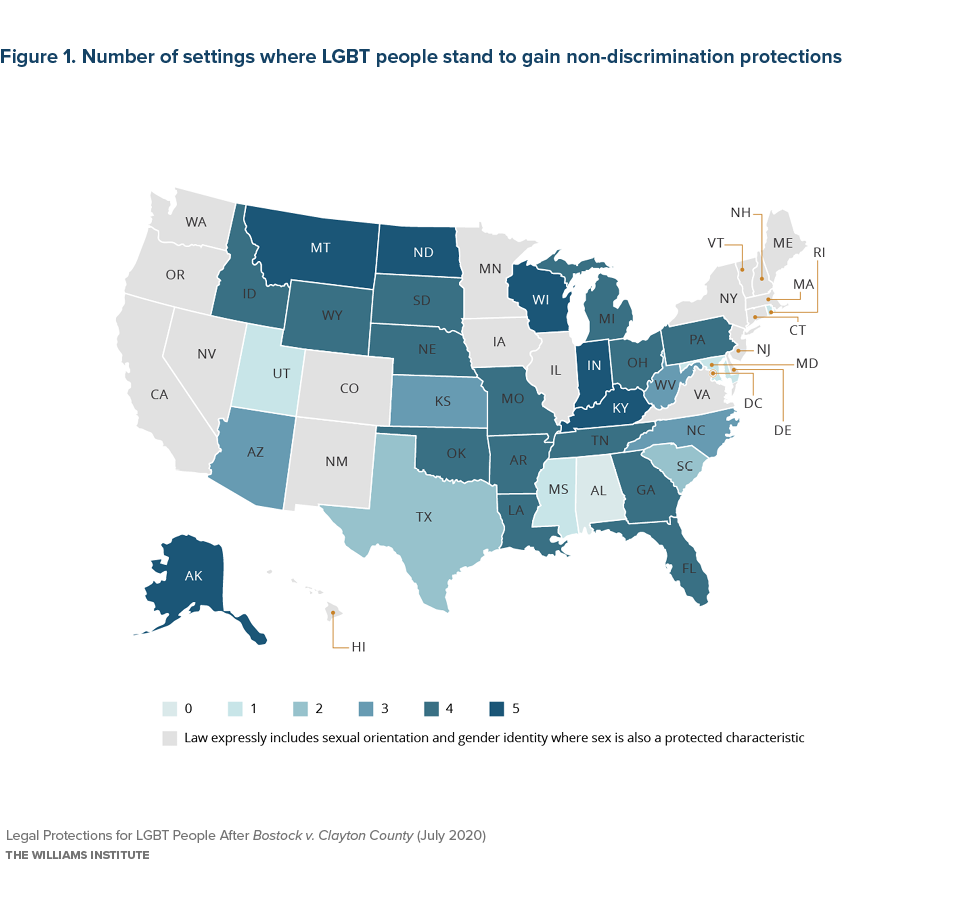Executive Summary
The U.S. Supreme Court’s landmark decision in Bostock v. Clayton County affirmed that Title VII protects employees nationwide from discrimination based on their sexual orientation and gender identity. While the case directly addresses discrimination within the employment context, the reasoning adopted by the Court has implications for civil rights laws that prohibit discrimination in other settings. Courts have often looked to Title VII case law when interpreting analogous provisions in other federal and state laws. These decisions indicate that courts will adopt the Court’s reasoning in Bostock to find that other sex non-discrimination laws also protect LGBT people from discrimination.
State laws remain an important source of protection for LGBT people even though Bostock guarantees federal protections in employment because many state non-discrimination laws are broader in scope than Title VII, and many of them protect people from discrimination based on sex in settings where federal law does not, such as in public accommodations. In addition, courts have not yet extended the Court’s ruling in Bostock to other federal laws that prohibit discrimination based on sex, and the current presidential administration has indicated that it is opposed to such extensions.
This report provides an overview of state sex non-discrimination laws that could be interpreted by courts and executive branch agencies to prohibit discrimination based on sexual orientation and gender identity consistent with the Court’s decision in Bostock, with a focus on the states without statutes that expressly bar discrimination based on these characteristics. It also provides estimates of the number of LGBT people in each state who stand to gain protections under these laws. The estimates are based on analysis presented in an April 2020 Williams Institute report, LGBT People in the US Not Protected by State Non-Discrimination Statutes.
Key Findings
Employment
Twenty-seven states have laws that prohibit employment discrimination based on sex, but not based on both sexual orientation and gender identity.
- An additional 3.6 million LGBT employees would gain protections from employment discrimination under state laws if these provisions are interpreted consistent with Bostock.
- Eighteen of these states’ laws apply to smaller employers than Title VII does. LGBT employees who are not covered under Title VII will gain legal protections from discrimination if these laws are interpreted consistent with Bostock.
- Four states’ laws offer more robust remedies than Title VII, potentially allowing employees to recover higher monetary damages than they could through a suit brought under federal law.
Housing
Twenty-six states have laws that prohibit housing discrimination based on sex, but not based on both sexual orientation and gender identity.
- An additional 5.2 million LGBT adults would gain protections from housing discrimination under state laws if these provisions are interpreted consistent with Bostock.
- This would close to double the number of LGBT adults protected from housing discrimination under state laws.
Public Accommodations
Twenty-three states have laws that prohibit public accommodations discrimination based on sex, but not based on both sexual orientation and gender identity.
- An additional 4.3 million LGBT people age 13 and older would gain protections from public accommodations discrimination under state laws if these provisions are interpreted consistent with Bostock.
- This would be a 66% increase in the number of LGBT people protected from public accommodations discrimination under state laws.
Education
Fourteen states have laws that prohibit education discrimination based on sex, but not based on both sexual orientation and gender identity.
- An additional 790,000 LGBT students age 15 and older would gain protections from education discrimination under state laws if these provisions are interpreted consistent with Bostock.
- This would be a 54% increase in the number of LGBT students protected from education discrimination under state laws.
Credit
Fifteen states have laws that prohibit credit discrimination based on sex, but not based on either sexual orientation or gender identity.
- An additional 2.5 million LGBT adults would gain protections from credit discrimination under state laws if these provisions are interpreted consistent with Bostock.
- This would be a 76% increase in the number of LGBT adults protected from credit discrimination under state laws.
